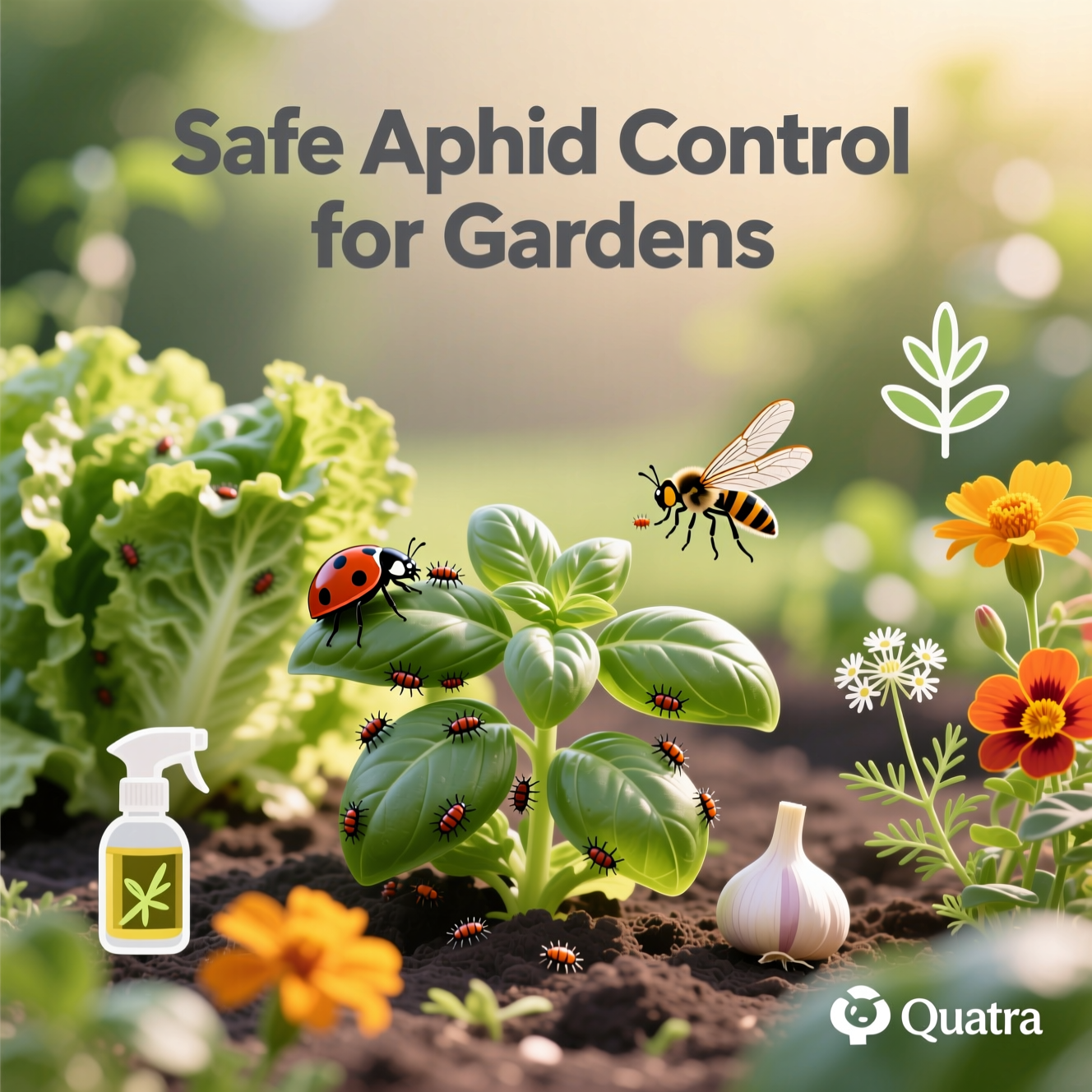What are the Most Effective Organic Methods to Get Rid of Aphids?
Effective organic aphid control focuses on natural pest removal. Horticultural soap and neem oil are widely recognized for their efficacy. Insecticidal soap works by disrupting aphid cell membranes. Neem oil acts as an antifeedant and growth regulator, disrupting their life cycle.
For most gardeners, encouraging beneficial insects is a key strategy for sustainable garden pest management. Aphids reproduce rapidly, with some species capable of producing several generations per month. Encouraging beneficial insects like ladybugs, which can consume up to 5,000 aphids in a single season, is a cornerstone of sustainable control. Introducing ladybugs can reduce aphid populations by 90% within two weeks in ideal conditions.
How Can I Make a Natural Insecticide Using Dish Soap, Vinegar, and Water?
Creating a DIY aphid spray is an effective organic pest control method. A common recipe involves mixing 1 tablespoon of mild liquid dish soap and 1 tablespoon of vinegar with 1 quart of water. This simple solution helps to emulsify and break down the waxy outer layer of aphids, disrupting their ability to absorb moisture and leading to dehydration. For most gardeners, this DIY approach offers a readily available alternative to synthetic pesticides.
This vinegar bug spray works by directly affecting the insect’s protective cuticle. Dish soap helps the mixture adhere to the leaf surface and emulsify plant sap. However, concentrated dish soap solutions can cause leaf burn in over 10% of cases if not properly diluted. Therefore, testing this dish soap insecticide on a small leaf area first is highly recommended to avoid potential phytotoxicity, especially on sensitive plants. Modern best practices emphasize caution with any DIY spray to protect plant health.
Are Soapy Water Sprays Safe for My Vegetable and Flower Plants?
Mild soapy water, formulated from pure castile or biodegradable dish soaps, presents a safe option for controlling soft-bodied insects on plants. Horticultural soaps specifically target pests like aphids by rupturing their cell membranes. This method offers a viable organic garden spray for most common garden pests.
When applied correctly, insecticidal soap demonstrates effectiveness against aphids, with studies indicating less than a 5% risk of plant damage when properly diluted. It acts by disrupting their breathing mechanisms and cell integrity. In practical terms, avoid spraying during intense sunlight hours. High temperatures can exacerbate the solution’s effect on leaf pores, potentially impacting plant respiration and causing scorching. Ensure proper application techniques to safeguard plant health and maximize efficacy.
What Other Natural Recipes Work as Garden Pest Control for Aphids?
Beyond common household items, several potent natural garden pest control recipes effectively target aphids. These homemade bug repellent solutions leverage plant-based compounds to protect your garden organically. For most gardeners seeking organic aphid remedies, a well-prepared garlic spray acts as a powerful deterrent. Several cloves blended with water create a potent mixture that repels pests by overwhelming their sense of smell.
Furthermore, chili pepper preparations, utilizing the natural irritant capsaicin, can also discourage aphid feeding. Some gardeners also turn to diluted essential oils, such as peppermint or rosemary, for their repellent properties. These botanical insecticides work as both contact killers and deterrents. Recent studies suggest garlic spray can reduce aphid infestations by up to 70% due to its strong, persistent odor, effectively safeguarding your plants.
How Can I Encourage Natural Predators to Control Aphids in My Garden?
Encouraging beneficial insects is a key strategy for natural pest control in your garden. Ladybugs, lacewings, hoverflies, and parasitic wasps are effective aphid predators. Creating a welcoming habitat for these garden allies is crucial for long-term aphid management. This approach enhances your garden’s ecosystem health.
Habitat creation involves planting specific flowering plants like dill, fennel, yarrow, and cosmos. These plants provide essential nectar and pollen for adult predators. For instance, a single ladybug larva can consume over 100 aphids daily, demonstrating their significant impact. Providing these resources can increase beneficial insect populations by 50%.
In practical terms, this sustainable method reduces reliance on chemical treatments. Modern gardeners emphasize fostering biodiversity for robust pest management. These natural predators offer a consistent and eco-friendly solution against aphid infestations.
What Are the Best Ways to Physically Remove Aphids from Plants?
For most gardeners seeking immediate solutions, physical aphid removal offers effective control. Handpicking aphids directly from plants is a straightforward method for small infestations. For larger areas, a strong water jet from a hose can dislodge these pests. This approach is often sufficient to disrupt their feeding and reproduction cycles. Maintaining good garden hygiene is also crucial in preventing future outbreaks and aiding in physical removal.
Employing a strong water blast can remove up to 80% of aphids from a plant in a single application, significantly reducing their population. For persistent issues, consider strategically placed sticky traps to capture flying adult aphids and monitor their movement. Pruning heavily infested leaves and stems can also be an effective strategy, especially if the infestation is localized. These methods emphasize direct intervention and contribute to overall plant health.
Can Vinegar Alone Keep Bugs Away from My Garden Plants?
Vinegar offers a limited role in garden pest control. Its primary component, acetic acid, can act as a mild deterrent due to its strong odor and can disrupt the outer layer of certain soft-bodied insects. However, its efficacy as a standalone bug repellent is generally insufficient for comprehensive garden protection.
Direct application of undiluted vinegar poses a significant risk to plants. It can drastically alter soil pH; for instance, undiluted vinegar can lower soil pH by 2 points, potentially causing plant stress and leaf damage. While a highly diluted solution might offer a temporary deterrent effect, its effectiveness is short-lived and can exacerbate soil acidity. For most gardeners, this means vinegar is best used cautiously and often in conjunction with other natural deterrents rather than as a primary solution for garden pest control.

Tyler manages the physical testing of LEDs, pumps, and sensors. With a background in mechanical systems, he is the architect behind our ROI and Yield calculators, transforming complex hardware specs into actionable data for our readers.

